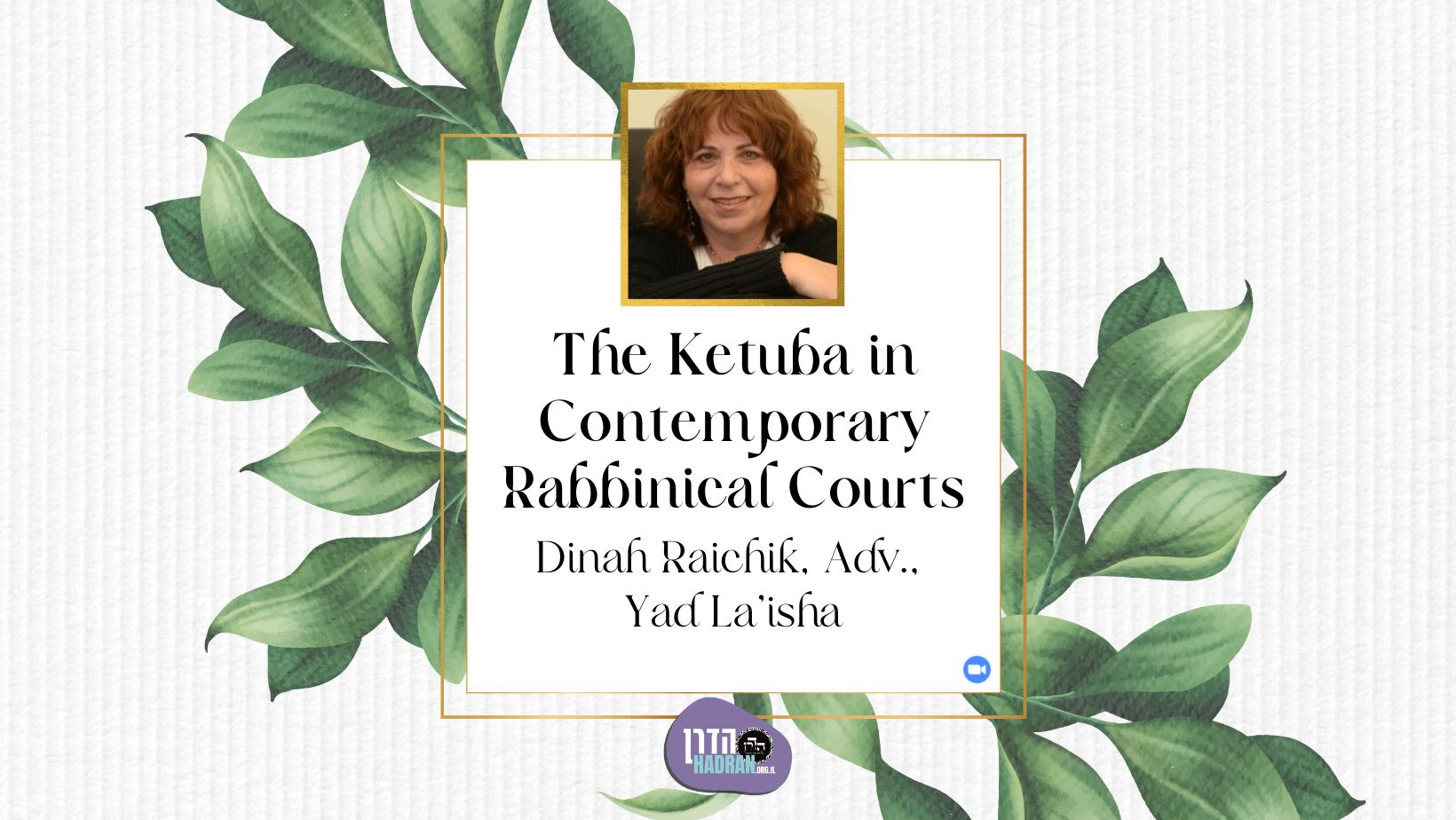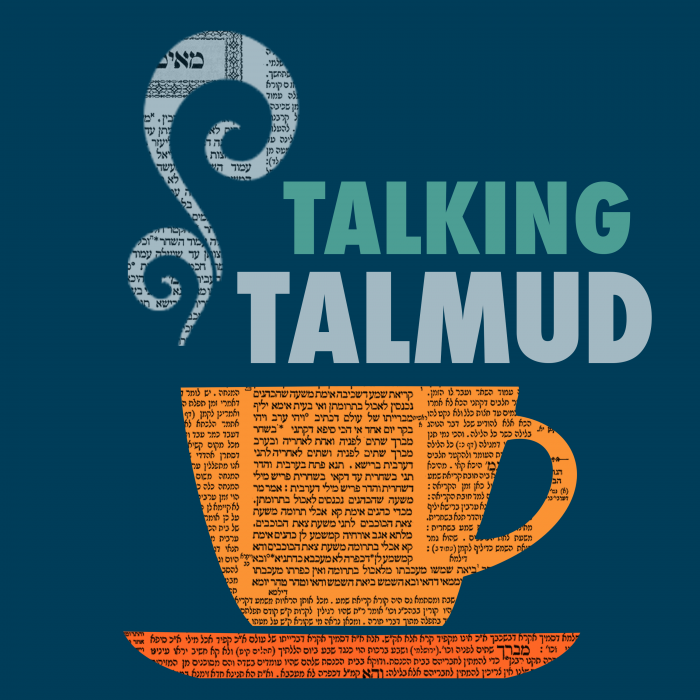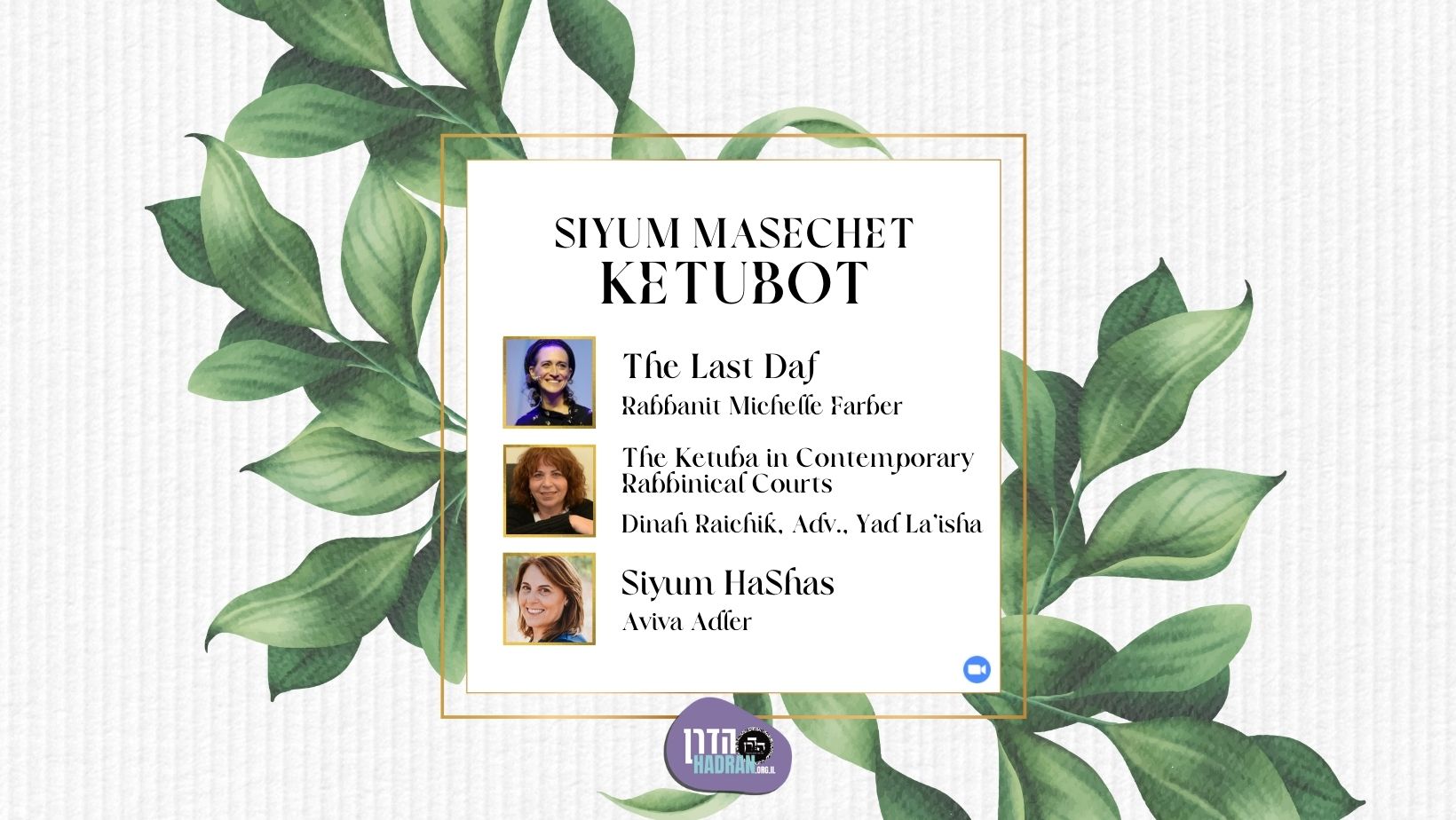This month’s learning is dedicated in memory of Rabbi Dr. Raymond Harari z”l, on his 1st yahrzeit. As an educator, principal of Yeshiva of Flatbush, and community rabbi, he inspired thousands with his wisdom, warmth, and unwavering commitment to Torah.
Want to dedicate learning? Get started here:

Today’s daily daf tools:
This month’s learning is dedicated in memory of Rabbi Dr. Raymond Harari z”l, on his 1st yahrzeit. As an educator, principal of Yeshiva of Flatbush, and community rabbi, he inspired thousands with his wisdom, warmth, and unwavering commitment to Torah.
Today’s daily daf tools:
Delve Deeper
Broaden your understanding of the topics on this daf with classes and podcasts from top women Talmud scholars.
New to Talmud?
Check out our resources designed to help you navigate a page of Talmud – and study at the pace, level and style that fits you.
The Hadran Women’s Tapestry
Meet the diverse women learning Gemara at Hadran and hear their stories.
Ketubot 112
וְהָוְיָא כְּמִבֵּי מִיכְסֵי עַד אַקְרָא דְתוּלְבַּנְקֵי, עֶשְׂרִין וְתַרְתֵּין פַּרְסֵי אוּרְכָּא וּפוּתְיָא שִׁיתָּא פַּרְסֵי.
and it was the same in area as that which stretches from the city of Bei Mikhsei until the fortress of Tulbanki: Its length twenty-two parasangs and its width six parasangs, 132 square parasangs, which is 2,112 square mil.
רַבִּי חֶלְבּוֹ וְרַבִּי עַוִּירָא וְרַבִּי יוֹסֵי בַּר חֲנִינָא אִיקְּלַעוּ לְהָהוּא אַתְרָא. אַיְיתוֹ קַמַּיְיהוּ אֲפַרְסְקָא דַּהֲוָה כְּאִילְפַּס כְּפַר הִינוֹ. וְאִילְפַּס כְּפַר הִינוֹ כַּמָּה הָוֵי — חָמֵשׁ סְאִין. אָכְלוּ שְׁלִישׁ, וְהִפְקִירוּ שְׁלִישׁ, וְנָתְנוּ לִפְנֵי בְּהֶמְתָּן שְׁלִישׁ.
§ The Gemara relates that Rabbi Ḥelbo, Rabbi Avira, and Rabbi Yosei bar Ḥanina happened to come on one occasion to a certain place. The locals brought before these Sages a peach [afarseka] that was as large as a stewpot [ilpas] of Kefar Hino. The Gemara asks: And how big is a stewpot of Kefar Hino? The Gemara answers: It has a capacity of five se’a. They ate one-third of it, they declared ownerless one-third of it, and they placed before their animals one-third of it.
לְשָׁנָה אִיקְּלַע רַבִּי אֶלְעָזָר לְהָתָם וְאַיְיתוֹ לְקַמֵּיהּ (נְקַטוּ) [נַקְטֵיהּ] בִּידֵיהּ, וְאָמַר: ״אֶרֶץ פְּרִי לִמְלֵחָה מֵרָעַת יוֹשְׁבֵי בָהּ״.
In the following year, Rabbi Elazar happened to come to that same place, and they brought a peach before him. He held it in his hand, as the peach was small enough for him to grasp in one hand, and he said, in reference to the change in size of the fruit from the previous year: “A fruitful land into a salt waste, from the wickedness of they who dwell there” (Psalms 107:34), i.e., their sins caused the drastic change in the yield of the produce.
רַבִּי יְהוֹשֻׁעַ בֶּן לֵוִי אִיקְּלַע לְגַבְלָא, חֲזַנְהוּ לְהָנְהוּ קִטּוּפֵי דַּהֲווֹ קָיְימִי כִּי עִיגְלֵי, אָמַר: עֲגָלִים בֵּין הַגְּפָנִים? אֲמַרוּ לֵיהּ: קִטּוּפֵי נִינְהוּ. אָמַר: אֶרֶץ אֶרֶץ, הַכְנִיסִי פֵּירוֹתַיִיךְ, לְמִי אַתְּ מוֹצִיאָה פֵּירוֹתַיִיךְ, לְגוֹיִם הַלָּלוּ שֶׁעָמְדוּ עָלֵינוּ בְּחַטֹּאתֵינוּ?
§ Once Rabbi Yehoshua ben Levi happened to come to Gavla, in the Golan, and he saw those clusters of vines that were standing as large as calves. He said to the locals: Calves are standing between the grapevines and you are not concerned that they will cause damage? They said to him: They are clusters. Rabbi Yehoshua ben Levi said: O earth, O earth! Gather in your fruit. For whom do you produce your fruit? For these gentiles who stand over us in our sins? It would be preferable if you did not produce such large fruit.
לְשָׁנָה אִיקְּלַע רַבִּי חִיָּיא לְהָתָם, חֲזַנְהוּ דַּהֲווֹ קָיְימִי כְּעִיזֵּי, אָמַר: עִזִּים בֵּין הַגְּפָנִים? אֲמַרוּ לֵיהּ: זִיל, לָא תַּעֲבֵיד לַן כִּי חַבְרָךְ.
The following year, Rabbi Ḥiyya happened to come to that same place, and he saw clusters that were standing as large as goats. He said: Goats are standing between the grapevines. They said to him: Go away; do not do to us what your colleague has done. Rabbi Yehoshua ben Levi’s curse was already fulfilled, as the fruit had shrunk from the previous year.
תָּנוּ רַבָּנַן: בְּבִרְכוֹתֶיהָ שֶׁל אֶרֶץ יִשְׂרָאֵל — בֵּית סְאָה עוֹשָׂה חֲמֵשֶׁת רִיבּוֹא כּוֹרִין, בִּישִׁיבָתָהּ שֶׁל צוֹעַן — בֵּית סְאָה עוֹשָׂה שִׁבְעִים כּוֹרִין. דְּתַנְיָא, אָמַר רַבִּי מֵאִיר: אֲנִי רָאִיתִי בְּבִקְעַת בֵּית שְׁאָן בֵּית סְאָה עוֹשָׂה שִׁבְעִים כּוֹרִין.
§ The Sages taught: In years of blessings of Eretz Yisrael, an area of land measuring one beit se’a produces fifty thousand kor. By way of comparison, when Zoan, a fertile region in Egypt, was settled, one beit se’a there would produce only seventy kor. As it is taught in a baraita that Rabbi Meir said: I saw in the valley of Beit She’an that one beit se’a produced seventy kor, which teaches that the soil of a good-quality and irrigated stretch of land outside the borders of Eretz Yisrael will naturally yield this quantity of produce.
וְאֵין לְךָ מְעוּלָּה בְּכׇל אֲרָצוֹת יוֹתֵר מֵאֶרֶץ מִצְרַיִם, שֶׁנֶּאֱמַר: ״כְּגַן ה׳ כְּאֶרֶץ מִצְרַיִם״. וְאֵין לְךָ מְעוּלָּה בְּכׇל אֶרֶץ מִצְרַיִם יוֹתֵר מִצּוֹעַן — דַּהֲווֹ מְרַבּוּ בַּהּ מְלָכִים, דִּכְתִיב: ״כִּי הָיוּ בְצוֹעַן שָׂרָיו״. וְאֵין לְךָ טְרָשִׁים בְּכׇל אֶרֶץ יִשְׂרָאֵל יוֹתֵר מֵחֶבְרוֹן, דַּהֲווֹ קָבְרִי בָּהּ שָׁיכְבֵי.
And you have no more outstanding earth among all the lands other than the land of Egypt, as it is stated: “Like the garden of the Lord, like the land of Egypt” (Genesis 13:10). And you have no more outstanding region in all of the land of Egypt than Zoan. The superior quality of Zoan is derived from the fact that they would raise kings there, as it is written: “For his princes are at Zoan” (Isaiah 30:4). And you have no rockier terrain in all of Eretz Yisrael than Hebron, as people would bury their dead there, e.g., the Patriarchs in the Cave of Machpelah, because the land was not arable.
וַאֲפִילּוּ הָכִי, חֶבְרוֹן מְבוּנָּה עַל אַחַת מִשִּׁבְעָה בְּצוֹעַן, דִּכְתִיב: ״וְחֶבְרוֹן שֶׁבַע שָׁנִים נִבְנְתָה לִפְנֵי צוֹעַן מִצְרָיִם״, מַאי ״נִבְנְתָה״? אִילֵימָא נִבְנְתָה מַמָּשׁ, אֶפְשָׁר אָדָם בּוֹנֶה בַּיִת לִבְנוֹ קָטָן קוֹדֶם שֶׁיִּבְנֶה לִבְנוֹ גָּדוֹל? שֶׁנֶּאֱמַר: ״וּבְנֵי חָם כּוּשׁ וּמִצְרַיִם וּפוּט וּכְנָעַן״!
And even so, Hebron was more developed, i.e., more fertile, than Zoan by sevenfold, as it is written: “Now Hebron was built [nivneta] seven years before Zoan in Egypt” (Numbers 13:22). What is the meaning of the term: Nivneta, in this verse? If we say it means literally that Hebron was built before Zoan, would a person build a house for his younger son before building one for his older son? As it is stated: “And the sons of Ham: Cush, and Mizraim, and Put, and Canaan” (Genesis 10:6), which indicates that Egypt, Mizraim, was older than Canaan, in whose territory Hebron was located.
אֶלָּא שֶׁמְּבוּנָּה עַל אַחַת מִשִּׁבְעָה בְּצוֹעֵן. וְהָנֵי מִילֵּי בִּטְרָשִׁים, אֲבָל שֶׁלֹּא בִּטְרָשִׁים — חֲמֵשׁ מְאָה.
Rather, the meaning of the verse is that Hebron was more developed and more fertile than Zoan by sevenfold, which means that Hebron produced 490 kor, seven times more than the seventy kor of regular fertile land, as stated above. And this applies only to the rocky terrain of Eretz Yisrael, e.g., Hebron, whereas those parts of Eretz Yisrael that were not rocky produced even more, up to five hundred kor.
וְהָנֵי מִילֵּי שֶׁלֹּא בְּבִרְכוֹתֶיהָ, אֲבָל בְּבִרְכוֹתֶיהָ, כְּתִיב: ״וַיִּזְרַע יִצְחָק בָּאָרֶץ הַהִיא וְגוֹ׳״.
And this applies only to a year when Eretz Yisrael is not blessed. However, with regard to a year when it was blessed, it is written: “And Isaac sowed in that land, and found in the same year a hundredfold” (Genesis 26:12). Isaac’s field produced one hundred times the normal yield, which according to the above calculations is fifty thousand kor, as stated in the baraita.
תַּנְיָא, אָמַר רַבִּי יוֹסֵי: סְאָה בִּיהוּדָה הָיְתָה עוֹשָׂה חָמֵשׁ סְאִין: סְאָה קֶמַח, סְאָה סֹלֶת, סְאָה סוּבִּין, סְאָה מוּרְסִין, וּסְאָה קִיבּוֹרְיָא. אֲמַר לֵיהּ הָהוּא צַדּוּקִי לְרַבִּי חֲנִינָא: יָאֵה מְשַׁבְּחִיתוּ בַּהּ בְּאַרְעֲכוֹן. בֵּית סְאָה אַחַת הִנִּיחַ לִי אַבָּא, מִמֶּנָּה מְשַׁח, מִמֶּנָּה חֲמַר, מִמֶּנָּה עִיבוּר, מִמֶּנָּה קִיטְנִיּוֹת, מִמֶּנָּה רוֹעוֹת מִקְנָתִי.
§ It is taught in a baraita that Rabbi Yosei said: A se’a of wheat in Judea would produce five se’a. How so? It would yield a se’a of flour; a se’a of fine flour; a se’a of bran fiber, from the outer layer of the grain; a se’a of coarse bran, i.e., flour mixed with bran fiber; and a se’a of cibarium [kiburaya], inferior flour. A certain Sadducee said to Rabbi Ḥanina: You have done well in praising your land; my father left me one beit se’a of land in Eretz Yisrael and from it I am able to produce oil, from it I produce wine, from it I grow produce, from it I grow legumes, and with it I provide pasture from which my sheep graze.
אֲמַר לֵיהּ הָהוּא בַּר אֱמוֹרָאָה לְבַר אַרְעָא דְיִשְׂרָאֵל: הַאי [תָּאלְתָּא] דְּקָיְימָא אַגּוּדָּא דְיַרְדְּנָא כַּמָּה גָּדְרִיתוּ מִינַּהּ? אֲמַר לֵיהּ: שִׁיתִּין כּוֹרֵי. אֲמַר לֵיהּ: אַכַּתִּי לָא עָיְילִיתוּ בָּהּ אַחְרֵיבְתּוּהָ, אֲנַן מְאָה וְעֶשְׂרִים כּוֹרֵי הֲוָה גָּזְרִינַן מִינַּהּ. אֲמַר לֵיהּ: אֲנָא נָמֵי מֵחַד גִּיסָא קָאָמֵינָא לָךְ.
A certain Amorite once said to a resident of Eretz Yisrael: That palm tree which stands on the banks of the Jordan, how many dates are you able to pick from it? He said to him: Sixty kor. The Amorite said to him: You have not yet fully entered Eretz Yisrael and yet you have already succeeded in destroying it. We would pick off that tree 120 kor. The resident said to him: I too am speaking to you about only one side of the tree, as I have not yet picked the fruit off the other side.
אָמַר רַב חִסְדָּא, מַאי דִּכְתִיב: ״וְאֶתֶּן לָךְ אֶרֶץ חֶמְדָּה נַחֲלַת צְבִי״, לָמָּה אֶרֶץ יִשְׂרָאֵל נִמְשְׁלָה לִצְבִי? לוֹמַר לְךָ: מָה צְבִי זֶה אֵין עוֹרוֹ מַחֲזִיק בְּשָׂרוֹ, אַף אֶרֶץ יִשְׂרָאֵל אֵינָהּ מַחְזֶקֶת פֵּירוֹתֶיהָ. דָּבָר אַחֵר: מָה צְבִי זֶה קַל מִכׇּל הַחַיּוֹת, אַף אֶרֶץ יִשְׂרָאֵל קַלָּה מִכׇּל הָאֲרָצוֹת לְבַשֵּׁל אֶת פֵּירוֹתֶיהָ.
§ Rav Ḥisda said: What is the meaning of that which is written: “And give you a pleasant land, the goodliest [tzvi] heritage” (Jeremiah 3:19)? Why is Eretz Yisrael likened to a deer [tzvi]? This comparison comes to tell you that just as with regard to this deer, its skin cannot contain its meat once it has been skinned, so too, Eretz Yisrael cannot contain its fruit once it has been picked, due to the great quantity of the produce. Alternatively, just as this deer is swifter than all the other beasts, so too Eretz Yisrael is swifter to ripen its fruit than all the other countries.
אִי מָה צְבִי זֶה קַל וְאֵין בְּשָׂרוֹ שָׁמֵן — אַף אֶרֶץ יִשְׂרָאֵל קַלָּה לְבַשֵּׁל וְאֵין פֵּירוֹתֶיהָ שְׁמֵנִים, תַּלְמוּד לוֹמַר: ״זָבַת חָלָב וּדְבָשׁ״, שְׁמֵנִים מֵחָלָב וּמְתוּקִים מִדְּבַשׁ.
The Gemara asks: If so, one can suggest the following comparison: Just as this deer is swift and its meat is not fatty, so too, Eretz Yisrael is swift to ripen its fruit but its fruit is not fat and juicy. The Gemara explains: For this reason the verse states: “Flowing with milk and honey” (Exodus 3:8), to say that its fruit is fat and juicier than milk and sweeter than honey.
רַבִּי אֶלְעָזָר כִּי הֲוָה סָלֵיק לְאֶרֶץ יִשְׂרָאֵל, אָמַר: פְּלַטִי לִי מֵחֲדָא. כִּי סַמְכוּהוּ, אֲמַר: פְּלַטִי לִי מִתַּרְתֵּי. כִּי אוֹתְבוּהוּ בְּסוֹד הָעִיבּוּר, אֲמַר: פְּלַטִי לִי מִתְּלָת,
§ The Gemara relates that when Rabbi Elazar ascended to Eretz Yisrael he said: I have been spared one curse. When they ordained him and awarded him the title of Rabbi, he said: I have been spared two. When they appointed him to sit in the council of Sages who dealt with the intercalation of the calendar, he said: I have been spared three.
שֶׁנֶּאֱמַר: ״וְהָיְתָה יָדִי אֶל הַנְּבִיאִים הַחוֹזִים שָׁוְא וְגוֹ׳״. ״בְּסוֹד עַמִּי לֹא יִהְיוּ״ — זֶה סוֹד עִיבּוּר. ״וּבִכְתָב בֵּית יִשְׂרָאֵל לֹא יִכָּתֵבוּ״ — זֶה סְמִיכָה. ״וְאֶל אַדְמַת יִשְׂרָאֵל לֹא יָבוֹאוּ״ — כְּמַשְׁמָעוֹ.
As it is stated: “And My hand shall be against the prophets that see vanity, and that divine lies; they shall not be in the council of My people, neither shall they be written in the register of the house of Israel, neither shall they enter into the land of Israel; and you shall know that I am the Lord God” (Ezekiel 13:9). “They shall not be in the council of My people,” this is referring to the council of the intercalation of the calendar; “neither shall they be written in the register of the house of Israel,” this is referring to ordination; “neither shall they enter into the land of Israel,” this is understood as per its plain meaning. Rabbi Elazar merited that these three curses were not fulfilled in him.
רַבִּי זֵירָא כִּי הֲוָה סָלֵיק לְאֶרֶץ יִשְׂרָאֵל לָא אַשְׁכַּח מַבָּרָא לְמֶעְבַּר, נְקַט בְּמִצְרָא וְקָעָבַר. אֲמַר לֵיהּ הָהוּא צַדּוּקִי: עַמָּא פְּזִיזָא, דְּקַדְּמִיתוּ פּוּמַּיְיכוּ לְאוּדְנַיְיכוּ, אַכַּתִּי בִּפְזִיזוּתַיְיכוּ קָיְימִיתוּ? אֲמַר לֵיהּ: דּוּכְתָּא דְּמֹשֶׁה וְאַהֲרֹן לָא זְכוֹ לַהּ, אֲנָא מִי יֵימַר דְּזָכֵינָא לַהּ.
§ When Rabbi Zeira ascended to Eretz Yisrael he could not find a ferry to cross the Jordan River. He took hold of a rope that was strung across as a makeshift bridge and crossed the Jordan. A certain Sadducee said to him: Hasty people who put your mouths before your ears, when you said at the time of the giving of the Torah: “We will do” before “we will hear” (Exodus 24:7), you remain hasty to this day. Why couldn’t you wait a little longer to cross the river on a ferry? Rabbi Zeira said to him: This is a place where Moses and Aaron did not merit entering; who is to say that I will merit seeing this land? I hurried across before anything might occur to prevent my entrance into Eretz Yisrael.
רַבִּי אַבָּא מְנַשֵּׁק כֵּיפֵי דְעַכּוֹ. רַבִּי חֲנִינָא מְתַקֵּן מַתְקָלַיָּה. רַבִּי אַמֵּי וְרַבִּי אַסִּי
§ Rabbi Abba would kiss the rocks of Akko, which was on the coast of Eretz Yisrael. Rabbi Ḥanina would repair its stumbling blocks, i.e., any potholes in the land, so that travelers would not fall and consequently speak ill of Eretz Yisrael. Rabbi Ammi and Rabbi Asi
קָיְימִי מִשִּׁמְשָׁא לְטוּלָּא וּמִטּוּלָּא לְשִׁמְשָׁא. רַבִּי חִיָּיא בַּר גַּמָּדָא מִיגַּנְדַּר בְּעַפְרַהּ, שֶׁנֶּאֱמַר: ״כִּי רָצוּ עֲבָדֶיךָ אֶת אֲבָנֶיהָ וְאֶת עֲפָרָהּ יְחוֹנֵנוּ״.
would stand and pass from a sunny spot to a shady one, and from a shady spot to a sunny one, so that they would always sit in comfort and never have cause to remark that they were uncomfortable in Eretz Yisrael. Rabbi Ḥiyya bar Gamda would roll in the dust of the land, as it is stated: “For Your servants take pleasure in her stones, and love her dust” (Psalms 102:15).
אָמַר רַבִּי זֵירָא אָמַר רַבִּי יִרְמְיָה בַּר אַבָּא: דּוֹר שֶׁבֶּן דָּוִד בָּא — קָטֵיגוֹרְיָא בְּתַלְמִידֵי חֲכָמִים. כִּי אַמְרִיתַהּ קַמֵּיהּ דִּשְׁמוּאֵל אֲמַר צֵירוּף אַחַר צֵירוּף, שֶׁנֶּאֱמַר: ״וְעוֹד בָּהּ עֲשִׂירִיָּה וְשָׁבָה וְהָיְתָה לְבָעֵר״. תָּנֵי רַב יוֹסֵף: בָּזוֹזֵי, וּבָזוֹזֵי דְבָזוֹזִי.
The Gemara continues to discuss the messianic age. Rabbi Zeira said that Rabbi Yirmeya bar Abba said: In the generation in which the son of David will come there will be indictments [kateigorya], i.e., denouncements and incitements against Torah scholars. When I said this before Shmuel he said: The generation will undergo refinement after refinement, i.e., several stages of cleansing, as it is stated: “And if there be a tenth in it, it shall again be eaten up” (Isaiah 6:13). Rav Yosef taught about the messianic era: Despoilers and despoilers of despoilers will plunder Eretz Yisrael at that time.
אָמַר רַב חִיָּיא בַּר אָשֵׁי אָמַר רַב: עֲתִידִין כׇּל אִילָנֵי סְרָק שֶׁבְּאֶרֶץ יִשְׂרָאֵל שֶׁיִּטְעֲנוּ פֵּירוֹת, שֶׁנֶּאֱמַר: ״כִּי עֵץ נָשָׂא פִרְיוֹ תְּאֵנָה וָגֶפֶן נָתְנוּ חֵילָם״.
Rav Ḥiyya bar Ashi said that Rav said: In the future all barren trees in Eretz Yisrael will bear fruit, as it is stated: “For the tree bears its fruit, the fig tree and the vine yield their strength” (Joel 2:22). This verse indicates that every tree, not just the fig and vine, will produce fruit.
הֲדַרַן עֲלָךְ שְׁנֵי דַּיָּינֵי גְזֵירוֹת וּסְלִיקָא לַהּ מַסֶּכֶת כְּתוּבּוֹת























